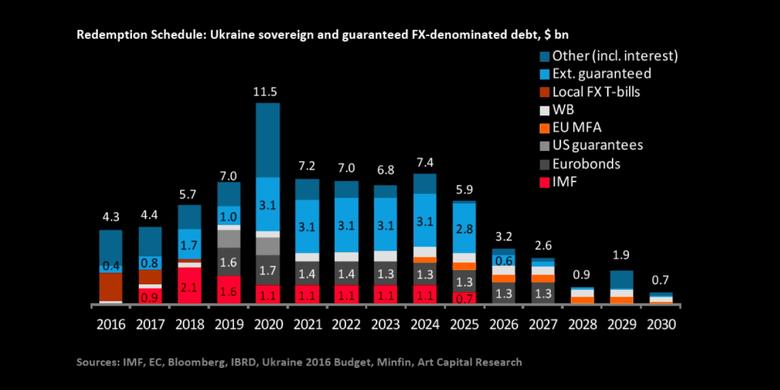
UKRAINE'S DEBT UP $5 BLN

IMF - June 9, 2020 - The Executive Board of the International Monetary Fund (IMF) approved today an 18-month Stand-by Arrangement for Ukraine, with access equivalent to SDR 3.6 billion (about US$5 billion or 179 percent of quota). The new program aims to help Ukraine to cope with COVID-19 pandemic challenges by providing balance of payments and budget support, while safeguarding achievements to date and advancing a small set of key structural reforms, to ensure that Ukraine is well-poised to return to growth when the crisis ends.
Ukraine’s track record in stabilizing the economy over the last 5 years has been strong. However, more reforms efforts are needed to ensure robust and inclusive growth. The outbreak of the COVID-19 pandemic has significantly worsened the outlook and has refocused government policies on containment and stabilization. Uncertainty is large, and the economy is projected to contract sharply in 2020 as strict containment measures—in Ukraine and globally—led to sizable falls in domestic and external demand. The 2020 budget is expected to be hit hard, with a sharp decline in revenues and large emergency spending needs to address the crisis. This has created large balance-of-payments and fiscal financing needs.
The new arrangement succeeds the 14-month SBA that was approved in December 2018, which was focused on maintaining stability during the election year (see Press Release No 18/483 ). Policies under the new arrangement will focus on four priorities: (i) mitigating the economic impact of the crisis, including by supporting households and businesses; (ii) ensuring continued central bank independence and a flexible exchange rate; (iii) safeguarding financial stability while recovering the costs from bank resolutions; and (iv) moving forward with key governance and anti-corruption measures to preserve and deepen recent gains.
The approval of the SBA enables the immediate disbursement of the equivalent of SDR 1.5 billion (about US$2.1 billion). The remainder will be phased over four reviews.
The Executive Board also discussed the ex-post evaluation of exceptional access under Ukraine’s 2015 extended arrangement under the Extended Fund Facility (EFF), which concluded that the extended arrangement helped restore macroeconomic stability and growth but did not fully address Ukraine’s underlying balance of payments vulnerabilities.
Following the Executive Board’s discussion on Ukraine, Ms. Kristalina Georgieva, Managing Director and Chair, issued the following statement:
“Sound fiscal and monetary policies since the 2014–15 crisis have resulted in a sharp reduction in Ukraine’s external and internal imbalances. Public debt was put on a downward path, inflation has declined, and international reserves have recovered. As noted by the Ex-Post Evaluation of Exceptional Access under the 2015 Extended Facility, while growth resumed, reform implementation has been uneven and steadfast implementation of structural reforms will be needed to create a more dynamic and competitive economy. At present, the humanitarian and economic crisis stemming from the COVID-19 pandemic, has refocused policy priorities away from deep structural reforms.
“The new Stand-By Arrangement will provide an anchor for the authorities’ efforts to address the impact of the crisis, while ensuring macroeconomic stability and safeguarding achievements to date. Together with support from the World Bank and the European Union, it will help address large financing needs. The program will focus on safeguarding medium-term fiscal sustainability, preserving central bank independence and the flexible exchange rate, and enhancing financial stability while recovering the costs from bank resolutions. Concerted reform efforts aimed at tackling corruption and strengthening governance will be critical to ensure macroeconomic stability and achieve sustainable and inclusive growth.
“The risks to the new program are very large. The uncertainty about the severity and length of the global downturn is exceptionally high. On the domestic side, uncertainty about the direction of economic policies remains substantial.
“Public debt remains high and government financing needs are large. While fiscal policies under the program will initially be directed at addressing the impact of the crisis, fiscal policy will need to be tightened as the recovery sets in, to place public debt back on a downward path.
“The National Bank of Ukraine (NBU) has skillfully managed monetary policy during a very challenging period. Central Bank independence should be preserved, and monetary and exchange rate policies should continue to provide a stable anchor in the context of the inflation-targeting regime, while allowing orderly exchange rate adjustment and preventing liquidity stress. Financial policies should strike a balance between preserving financial stability and assisting the recovery.
“Full and timely implementation of policies under the Fund-supported program will be critical to mitigate economic risks and lay the ground for stabilization and recovery.”
-----
Earlier:

2020, February, 12, 12:10:00
UKRAINE, RUSSIA, CRIMEA: $8 BLN
The Ukrainian company's claims against the Russian state over the Crimea assets were left out of a settlement deal with Russia's Gazprom agreed at the end of December, which canceled out all existing arbitration claims by both parties as part of a new transit contract.
|

2019, December, 9, 13:10:00
IMF FOR UKRAINE: $5.5 BLN
I was pleased to note that IMF staff has reached agreement with the authorities on the policies to underpin a new 3-year, SDR 4 billion (about US$ 5.5 billion) arrangement under the Extended Fund Facility.
|

2019, November, 8, 11:25:00
GAZPROM, UKRAINE STRATEGIC ISSUES
Alexey Miller pointed out that a number of strategic issues need to be resolved prior to the signing of a new transit contract.
|








